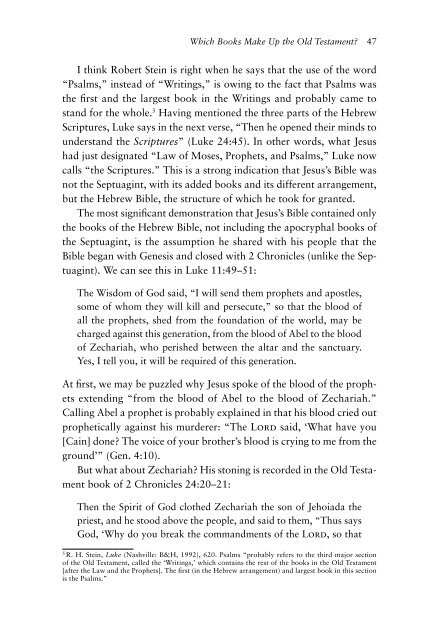Scriptures selfattesting authority question doctrine truthfulness Scriptures
peculiar-glory-en
peculiar-glory-en
Create successful ePaper yourself
Turn your PDF publications into a flip-book with our unique Google optimized e-Paper software.
Which Books Make Up the Old Testament? 47<br />
I think Robert Stein is right when he says that the use of the word<br />
“Psalms,” instead of “Writings,” is owing to the fact that Psalms was<br />
the first and the largest book in the Writings and probably came to<br />
stand for the whole. 5 Having mentioned the three parts of the Hebrew<br />
<strong>Scriptures</strong>, Luke says in the next verse, “Then he opened their minds to<br />
understand the <strong>Scriptures</strong>” (Luke 24:45). In other words, what Jesus<br />
had just designated “Law of Moses, Prophets, and Psalms,” Luke now<br />
calls “the <strong>Scriptures</strong>.” This is a strong indication that Jesus’s Bible was<br />
not the Septuagint, with its added books and its different arrangement,<br />
but the Hebrew Bible, the structure of which he took for granted.<br />
The most significant demonstration that Jesus’s Bible contained only<br />
the books of the Hebrew Bible, not including the apocryphal books of<br />
the Septuagint, is the assumption he shared with his people that the<br />
Bible began with Genesis and closed with 2 Chronicles (unlike the Septuagint).<br />
We can see this in Luke 11:49–51:<br />
The Wisdom of God said, “I will send them prophets and apostles,<br />
some of whom they will kill and persecute,” so that the blood of<br />
all the prophets, shed from the foundation of the world, may be<br />
charged against this generation, from the blood of Abel to the blood<br />
of Zechariah, who perished between the altar and the sanctuary.<br />
Yes, I tell you, it will be required of this generation.<br />
At first, we may be puzzled why Jesus spoke of the blood of the prophets<br />
extending “from the blood of Abel to the blood of Zechariah.”<br />
Calling Abel a prophet is probably explained in that his blood cried out<br />
prophetically against his murderer: “The Lord said, ‘What have you<br />
[Cain] done? The voice of your brother’s blood is crying to me from the<br />
ground’” (Gen. 4:10).<br />
But what about Zechariah? His stoning is recorded in the Old Testament<br />
book of 2 Chronicles 24:20–21:<br />
Then the Spirit of God clothed Zechariah the son of Jehoiada the<br />
priest, and he stood above the people, and said to them, “Thus says<br />
God, ‘Why do you break the commandments of the Lord, so that<br />
5<br />
R. H. Stein, Luke (Nashville: B&H, 1992), 620. Psalms “probably refers to the third major section<br />
of the Old Testament, called the ‘Writings,’ which contains the rest of the books in the Old Testament<br />
[after the Law and the Prophets]. The first (in the Hebrew arrangement) and largest book in this section<br />
is the Psalms.”


